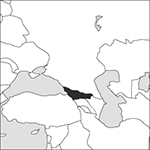
Source: MAPS IN MINUTES™ © RH Publications (1997)
Capital:
Tbilisi
Area:
69,700 sq km (26,900 sq miles)
Population:
4,555,911 (2013 est)
Currency:
1 lari = 100 tetri
Religions:
Eastern Orthodox 83.9%; Muslim 9.9%; Armenian Apostolic 3.9%
Ethnic Groups:
Georgian 83.8%; Azeri 6.5%; Armenian 5.7%
Languages:
Georgian (official); Russian; Armenian; Azeri; Abkhaz (official in Abkhazia); minority languages
International Organizations:
UN; OSCE; Council of Europe; Euro-Atlantic Partnership Council; WTO
A mountainous country in west Asia. It is separated from Russia in the north by the Caucasus Mountains. It has a coast on the Black Sea, shares a border with Turkey to the west, and is bounded by Azerbaijan and Armenia to the east and south.
Physical
About one-third of the land is forest. On the coastal plain and in the central valley fruit trees, palms, and eucalyptus flourish. By contrast, the east is treeless grassland, but rich in minerals.
Economy
Georgia’s mineral resources include coal, petroleum, manganese, copper, and gold, with mining of the last three being particularly important industries. Other industry includes beverages, metals, machinery, and chemicals. Principal agricultural products are citrus fruits, grapes, tea, hazelnuts, and vegetables.
History
Georgia has been a distinctive state since the 4th century bc. In the 3rd century ad it became part of the Sassanian empire but the Persians were expelled c.400. The 12th and 13th centuries saw territorial expansion and cultural achievement cut short by Mongol destruction. Revival was likewise curtailed by the ravages of Tamerlane (1386–1403) and national decline was confirmed by the decision of Alexander I to split the kingdom between his three sons. After some two and a half centuries of partition, the western half being under Ottoman rule, the eastern under Persian, the area was reunited by the Russian conquest of 1821–29.
Throughout the 19th century, Tsarist Russia continued to suppress Georgian nationalism. A strong Social Democrat Party of Mensheviks emerged in Georgia in the early 20th century, which formed a brief republic (1918–21), under British protection. In 1921 Georgia was conquered by the Red Army from Russia, and became part of the Transcaucasian Soviet Federal Socialist Republic with Azerbaijan and Armenia. A large-scale anti-communist uprising was suppressed in 1924 and in 1936 the Georgian Soviet Socialist Republic became a full member of the Soviet Union. Another uprising in the capital Tbilisi in 1956 was suppressed, and in April 1989 there were extensive riots, again brutally suppressed. In April 1991, however, it gained independence under President Zviad Gamsakhurdia. Opposition to Gamsakhurdia’s ‘dictatorial methods’ led to his deposition, following the outbreak of civil conflict in December 1991. In March 1992 Eduard Shevardnadze (Soviet Foreign Minister 1985–91) became Chairman of the State Council and in September he was elected President. The civil conflict continued throughout 1992 and 1993 as forces loyal to Gamsakhurdia attempted to gain control. In November, however, with the aid of Russian troops, government forces routed the rebels. The country was also beset by other internal conflicts. In 1989 a rebellion erupted in South Ossetia, which demanded greater autonomy and secession from Georgia. A ceasefire was eventually agreed in mid-1992 and South Ossetia confirmed its intention to secede. In August 1992, following periodic unrest since 1989, conflict began over the region of Abkhazia’s demands for independence. By September 1993 Georgian forces were defeated and expelled from the region. A provisional ceasefire was negotiated in April 1994, when Shevardnadze agreed to cede considerable autonomy to Abkhazia. In March 1995 Shevardnadze was re-elected as President. However, he was forced to resign in the Rose Revolution (2003) and was replaced by Mikhail Saakashvili, the leader of the opposition. Saakashvili’s popularity rapidly declined and more demonstrations led to early elections in 2008, which he narrowly won. Continued tensions over South Ossetia and Abhkazia led to a short war with Russia in 2008, which left Russia in occupation of the two regions; Russia subsequently recognized their independence. In 2012 the opposition Georgian Dream coalition won the parliamentary election, and in 2013 their candidate, Giorgi Margvelashvili, secured the Presidency. The coalition was re-elected in 2016 and continued its policy of moving closer to the EU and NATO.
- Herbert Smith refractometer
- herbicide
- Herbig Ae/Be star
- Herbig–Haro object
- herbivore
- Hercules
- Hercules Cluster
- Hercules X-1
- Herculina
- Hercynian orogeny
- hercynite
- Herder, Johann Gottfried (1744–1803)
- herd immunity
- hereditary property
- heredity
- Herelle, Felix d'
- Herero Wars (1904–08)
- heresy
- Heretaungan
- Hereward the Wake (11th century)
- Herfindahl index
- heritability
- heritage
- Hermann–Mauguin system
- hermaphrodite